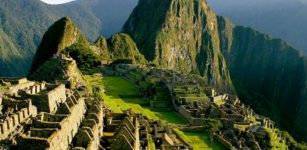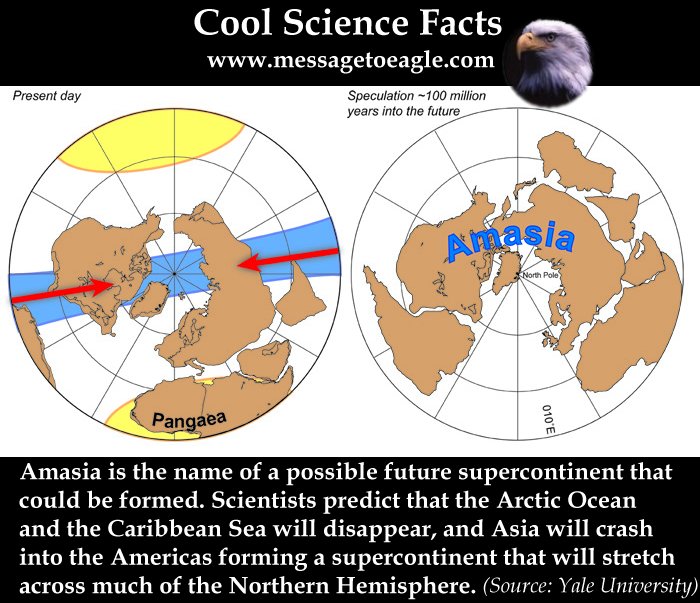Amasia – New Future Supercontinent
Question: When will a new supercontinent form on Earth?
Answer: Scientists have already named our next new supercontinent. It’s name is Amasia.
Geological record reveals that in the past 2 billion years, there have been three supercontinents. The oldest known supercontinent, Nuna, came together about 1.8 billion years ago. The next, Rodinia, existed about 1 billion years ago, and the most recent, Pangaea, came together about 300 million years ago.
See also: Stunning View Of What Supercontinent Pangea Looks Like Mapped With Modern Borders
Amasia, is a possible future supercontinent that could be formed. Scientists predict that the Arctic Ocean and the Caribbean Sea will disappear, and Asia will crash into the Americas forming a supercontinent that will stretch across much of the Northern Hemisphere.
This prediction relies mostly on the fact that the Pacific Plate is already subducting under Eurasia and North America, a process which if continued will eventually cause the Pacific to close.
Previous studies suggest that supercontinents last about 100 million years or so before they break apart, setting the pieces adrift to start another cycle.
MessageToEagle.com
Source:
Related Posts
-
 Did The Ancient Trojan Horse Really Exist?
No Comments | Aug 19, 2015
Did The Ancient Trojan Horse Really Exist?
No Comments | Aug 19, 2015 -
 Star Trek’s Version Of Time Travel Is More Realistic Than Most Science Fiction
No Comments | Jun 11, 2019
Star Trek’s Version Of Time Travel Is More Realistic Than Most Science Fiction
No Comments | Jun 11, 2019 -
 Time Warp And Cloning Of Past Events – How Possible Is It?
No Comments | Dec 19, 2015
Time Warp And Cloning Of Past Events – How Possible Is It?
No Comments | Dec 19, 2015 -
 Face Blindness Makes You Surrounded By Strangers: Why Some People Cannot Recognize Faces?
No Comments | Nov 6, 2016
Face Blindness Makes You Surrounded By Strangers: Why Some People Cannot Recognize Faces?
No Comments | Nov 6, 2016 -
 Aqrabuamelu – Mysterious Scorpion Men In Babylonian Mythology
No Comments | Jan 19, 2016
Aqrabuamelu – Mysterious Scorpion Men In Babylonian Mythology
No Comments | Jan 19, 2016 -
 Why We Can Assume Machu Picchu Is Older Than The Inca
No Comments | Mar 27, 2020
Why We Can Assume Machu Picchu Is Older Than The Inca
No Comments | Mar 27, 2020 -
 Algonquin People And The Myth Of The Medicine Woman In The Moon
No Comments | Feb 1, 2016
Algonquin People And The Myth Of The Medicine Woman In The Moon
No Comments | Feb 1, 2016 -
 Creator God Kururumany Who Introduced Death Into The World And Deprived Humans Of Immortality
No Comments | Dec 19, 2016
Creator God Kururumany Who Introduced Death Into The World And Deprived Humans Of Immortality
No Comments | Dec 19, 2016 -
 Is The Ancient Oarfish Legend Warning Of Coming Earthquakes True?
No Comments | Feb 28, 2017
Is The Ancient Oarfish Legend Warning Of Coming Earthquakes True?
No Comments | Feb 28, 2017 -
 Terrorism Of Today Predicted In Times Past? Mother Shipton, Nostradamus And Other Heralds
No Comments | Apr 13, 2017
Terrorism Of Today Predicted In Times Past? Mother Shipton, Nostradamus And Other Heralds
No Comments | Apr 13, 2017

